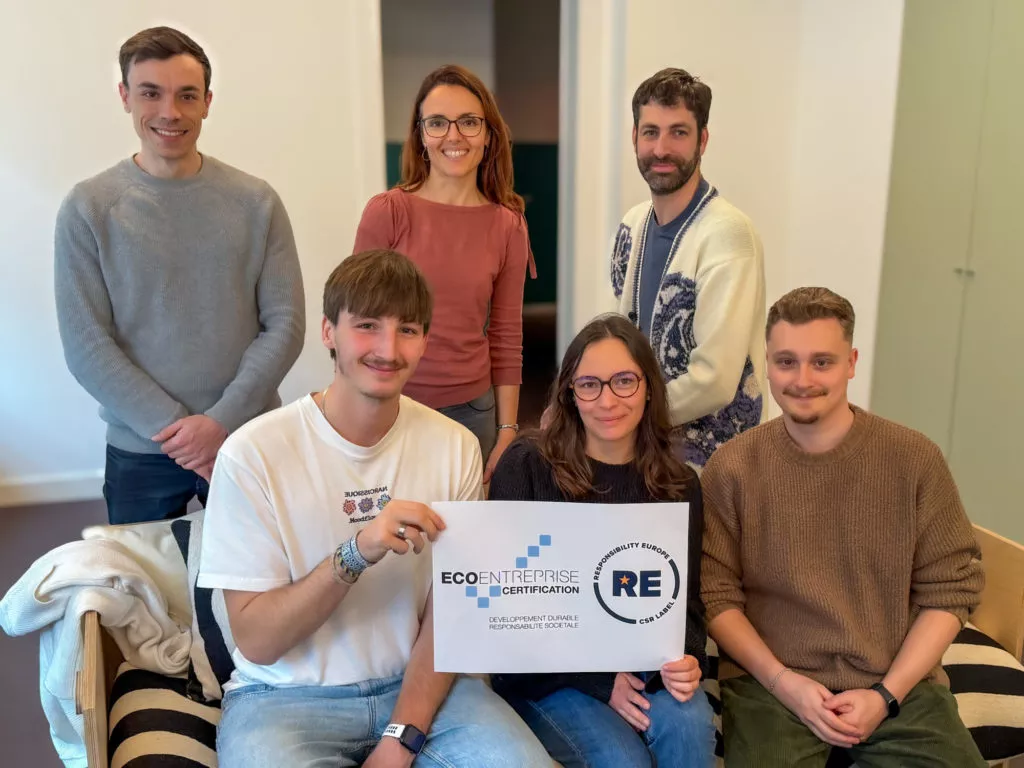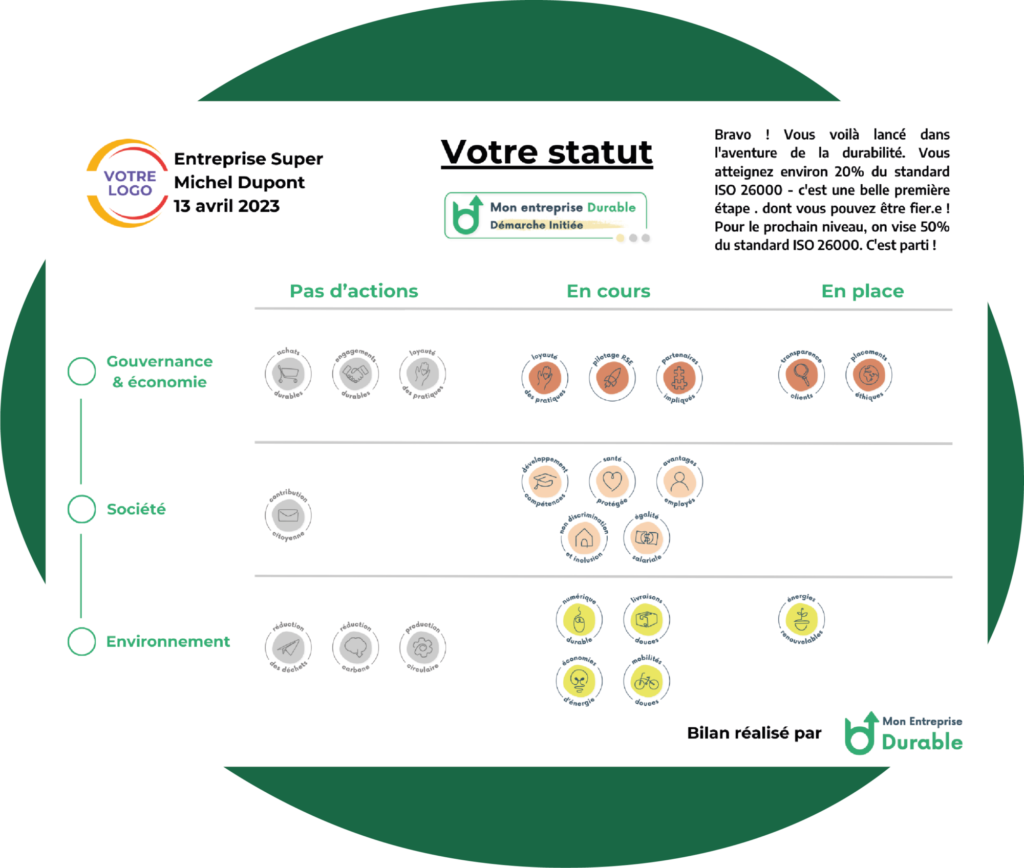Before you start reading
Welcome to Mon Entreprise Durable par Coptain! In a nutshell, our job is to enable CSR managers to multiply their impact! Want to get started on your CSR journey? We’re here to help! Contact us by by clicking here. The whole team wishes you happy reading!

Key points of the article
- 5 inspiring business success stories
- Example 1: Patagonia, the green outdoor pioneer
- Example 2: Zélo, the grocery store on the road to a zero-waste future
- Example 3: Infomaniak, the committed web host
- Example 4: Veja, the ethical fair trade sneaker
- Example 5: Alternative Bank Switzerland, positive impact financing
- Bonus: Mon Entreprise Durable, a CSR strategy for small businesses
5 inspiring business success stories
A few years ago, a major Swiss company made the headlines for less than flattering reasons. Swissaironce a symbol of national pride, collapsed under the weight of financial scandals and ethical lapses. This event left a lasting impression, underlining the crucial importance of Corporate Social Responsibility (CSR). Since then, many Swiss companies have taken bold steps to ensure ethical and sustainable conduct.
CSR is not just a theoretical concept or a passing trend. It has become a necessity for companies wishing to thrive in a world increasingly aware of environmental and social issues. Companies that succeed in this area set an example by integrating sustainable and ethical practices into their business model.
In this article, we explore five inspiring examples of companies that have turned their CSR approach into tangible success. These companies, whether in the outdoor, retail, web hosting, ethical fashion or finance sectors, all demonstrate that it is possible to reconcile profitability and responsibility. Get ready to discover how Patagonia, Zélo, Infomaniak, Veja and Alternative Bank Switzerland are revolutionizing their respective sectors through committed CSR.
Example 1: Patagonia, the green outdoor pioneer
Patagonia is an iconic company in the outdoor sector, but it’s not just for its high-quality equipment that the company is renowned. Since its creation in 1973 by Yvon Chouinard, Patagonia has been committed to an exemplary CSR approach, which today makes it a model for Swiss companies wishing to combine economic performance with social and environmental responsibility.
Patagonia has built its reputation on solid values: respect for the environment and the well-being of communities. As acertified B Corp company, it is committed to rigorous rigorous standards of social and environmental performance, accountability and transparency. This certification is not just another label, but a genuine commitment to continuous progress.
One of the most striking aspects of Patagonia’s CSR strategy is its “WornWear” clothing recycling program. This program encourages customers to return their old Patagonia clothing for repair, reuse or recycling. Not only does this reduce waste, it also promotes a circular economy, an increasingly relevant concept for Swiss companies wishing to reduce their ecological footprint.
Patagonia doesn’t just recycle; it also chooses sustainable materials for its products. For example, the majority of the brand’s clothing is made from organic cotton, recycled polyester and other eco-responsible fibers. What’s more, the company made a bold choice in 2018 by announcing that its tax profits would be reinvested in initiatives to combat climate change. This decision, while radical, shows just how deeply Patagonia’s environmental commitment is rooted in its DNA.
Another pillar of CSR at Patagonia is its social commitment. The company ensures that all its employees benefit from good working conditions, both in its offices and in its suppliers’ factories. It has set up worker support programs, offering benefits such as on-site crèches and flexible working hours. For Patagonia, a sustainable company is also one that takes care of its employees.
The company is also active in environmental activism. Patagonia dedicates 1% of its sales to environmental preservation initiatives through its “1% for the Planet” program. It supports numerous non-profit organizations working to protect ecosystems and natural habitats. This commitment shows that even companies can play a crucial role in protecting our planet.
Patagonia offers a multitude of lessons for businesses. Adopting a CSR approach means not just complying with environmental laws, but going beyond them to integrate these practices into every aspect of the business. Patagonia is demonstrating that such a strategy can not only benefit the environment and society, but also enhance customer reputation and loyalty, which are crucial to long-term success.
Example 2: Zélo, the grocery store on the road to a zero-waste future
Zélo is a grocery store unlike any other. Founded in Gland in 2020, this innovative company has taken the zero waste challenge head-on. In the space of just a few years, Zélo has become an essential reference point for those wishing to consume more responsibly in French-speaking Switzerland. The concept is simple but revolutionary: a mobile grocery store offering products without disposable packaging, delivered directly to your home or to collection points.
Zélo stands out for its business model focused on sustainability. Customers can order a wide range of food and non-food products online, all packaged in reusable containers. Once the products have been consumed, customers return the containers on the next delivery, creating a virtuous cycle of reuse. This system makes it possible to drastically reduce plastic waste and other packaging, a major issue in today’s society.
Zélo’s commitment goes beyond waste reduction. The grocery store favors local and organic productsby supporting Swiss producers and reducing the carbon footprint associated with transporting goods. By working directly with local producers, Zélo guarantees not only the freshness and quality of products, but also fair remuneration for farmers. This approach promotes a sustainable and resilient local economy.
Another remarkable aspect of Zélo’s CSR approach is its commitment to the community. The company regularly organizes workshops and educational events to raise public awareness of zero-waste issues and promote more responsible consumption patterns. These initiatives strengthen the bond between the grocery store and its customers, while spreading beneficial ecological practices to a wider public.
Zélo also adopts sustainable internal practices. All aspects of the business, from inventory management to logistics, are designed to minimize environmental impact. For example, the vehicles used for deliveries are electric, reducing CO2 emissions.
Zélo is an inspiring model for companies of what an integrated and innovative CSR approach can be. It demonstrates that it is possible to reconcile economic profitability with ecological responsibility. By adopting zero waste practices, supporting local producers and educating the community, Zélo creates value not only for its customers, but also for society and the environment.
Zélo’s success shows that the transition to a circular economy is not only possible, but desirable. By tackling waste at source and creating a consumption model based on reuse, the company is paving the way for new sustainable business practices. Swiss companies can draw inspiration from this example to develop their own zero-waste initiatives and strengthen their CSR commitment.
With Mon Entreprise Durable by Coptain, start your CSR process efficiently
Example 3: Infomaniak, the committed web host
Infomaniak is a major player in the Swiss web hosting sector, but what really sets it apart is its exemplary commitment to CSR. Since its creation in 1994, this Geneva-based company has constantly innovated to reduce its environmental impact while offering high-quality services to its customers.
Infomaniak has taken bold steps to become a leader in sustainability in the technology sector. The company uses only renewable energy to power its data centers, a choice that significantly reduces its carbon footprint. In 2007, Infomaniak was the first hosting company in Europe to fully offset its CO2 emissions, a commitment that continues today with even more ambitious initiatives.
One of the company’s flagship projects is the construction of environmentally-friendly data centers. Infomaniak has invested in infrastructures that use innovative cooling systems, thus minimizing energy consumption. For example, its data centers are cooled using groundwater rather than energy-hungry air-conditioning systems. This approach not only reduces energy consumption, but also extends equipment life.
Infomaniak doesn’t stop at reducing its environmental footprint. The company is also very active on the social front. It is committed to offering its employees optimal working conditions, including flexible working hours, telecommuting and ongoing training. Infomaniak promotes equal opportunities and diversity within its team, which strengthens the company’s cohesion and overall performance.
Another notable aspect of Infomaniak’s CSR approach is its commitment to transparency and ethics. The company regularly publishes detailed reports on its sustainability initiatives and performance. This transparency not only builds trust with customers and partners, but also inspires other companies to follow the same path.
Infomaniak also supports numerous local and international initiatives. The company invests in reforestation projects, funds environmental NGOs and supports actions to protect biodiversity. For example, Infomaniak is committed to donating 1% of its sales to environmental causes. This financial commitment demonstrates a concrete desire to have a positive impact beyond its core activities.
For companies, Infomaniak is a shining example of what an integrated, proactive CSR approach can achieve. The company demonstrates that it is possible to combine technology and sustainability, while remaining competitive in the marketplace. Adopting sustainable and responsible practices can not only improve brand image, but also attract like-minded customers and talent.
Example 4: Veja, the ethical fair trade sneaker
Veja is much more than a brand of sneakers; it’s a symbol of ethical commitment in the fashion industry. Founded in 2005 by Sébastien Kopp and François-Ghislain Morillion, Veja has quickly established itself as a pioneer in fair trade and sustainability. The company proves that it is possible to produce elegant footwear while respecting the highest standards of social and environmental responsibility.
Veja’s business model is based on total transparency. Unlike many brands that outsource their production under often opaque conditions, Veja works directly with cooperatives of small-scale producers in Brazil. These farmers grow organic cotton and wild rubber under fair conditions, guaranteeing a stable and fair income for their work. This choice of sustainable and organic materials reduces the environmental impact of each pair of shoes produced.
Veja also stands out for its commitment to environmentally-friendly production practices. The company uses eco-friendly materials such as organic cotton, wild Amazonian rubber and recycled plastic bottles to manufacture its sneakers. By avoiding harmful chemicals and favoring sustainable production methods, Veja minimizes its ecological footprint while offering high-quality products.
Veja’s commitment goes beyond the materials used. The company ensures that all stages of the production chain meet rigorous ethical standards. Veja’s partner factories in Brazil offer decent working conditions, fair wages and reasonable working hours. This commitment to the well-being of workers is a central pillar of Veja’s philosophy, in marked contrast to the often-criticized practices of the fashion industry.
In Switzerland, Veja has won over a customer base that is increasingly aware of ethical and environmental issues. Swiss consumers, known for their sensitivity to sustainability issues, find in Veja a brand that embodies their values. Points of sale across the country and online boutiques facilitate access to these ethical products, encouraging more people to opt for more responsible fashion.
Veja doesn’t just produce sustainable sneakers; it is also committed to education and public awareness. The company regularly shares detailed information about its practices and partners, enabling consumers to understand the impact of their choices. This transparency builds customer trust and loyalty, while inspiring other companies to adopt similar practices.
Veja is a powerful example of what a successful CSR approach can be in the fashion industry. By favoring sustainable materials, guaranteeing ethical working conditions and adopting total transparency, Veja demonstrates that it is possible to reconcile style, economic performance and social responsibility. This model can serve as a source of inspiration for any company wishing to integrate CSR into its core business.
Example 5: Alternative Bank Switzerland, positive impact financing
Alternative Bank Switzerland (BAS) is a shining example of what a financial institution can achieve when it places sustainability and ethics at the heart of its operations. Founded in 1990, BAS’s mission is to finance projects that have a positive impact on society and the environment, while offering transparent and fair banking services.
BAS stands out for its unique philosophy: using money responsibly to create social and ecological added value. Unlike traditional banks, which often invest in controversial sectors such as fossil fuels or armaments, BAS chooses to support projects in the fields of renewable energies, organic farming, social housing and the solidarity economy. This approach not only generates financial returns, but also promotes sustainable and inclusive development.
Transparency and ethics are the watchwords at BAS. The bank regularly publishes detailed reports on the use of funds and the impact of projects financed. This transparency strengthens customer confidence and demonstrates the bank’s commitment to social responsibility. BAS customers know exactly where their money is going and what types of projects they are supporting, which is a powerful loyalty-building factor.
Another key aspect of BAS’s CSR approach is its commitment to its employees. The bank offers attractive working conditions, including flexible working hours, opportunities for further training and a respectful working environment. By taking care of its employees, BAS ensures not only their well-being, but also their commitment and productivity, creating a virtuous circle.
BAS also plays an active role in public awareness and education. It organizes conferences, workshops and publications to inform citizens about the advantages of a sustainable, solidarity-based economy. This educational mission is crucial to encouraging collective awareness and promoting more responsible financial behavior.
Alternative Bank Switzerland is an inspiring model of ethical and sustainable finance. It shows that it is possible to reconcile profitability and responsibility by making informed investment choices and adopting transparent banking practices. Companies can draw inspiration from this example to develop their own responsible financing policies, whether in terms of investments or banking relationship management.
Bonus: Mon Entreprise Durable, a CSR strategy for small businesses
Mon Entreprise Durable perfectly embodies the implementation of a CSR strategy adapted to a structure with fewer than ten employees. Since the creation of our company, we have taken concrete steps to reduce our ecological footprint and promote a positive impact on society. Here are just a few of them.
In terms of soft mobility, we encourage our employees to adopt environmentally-friendly modes of transport for both business and personal travel. This support takes the form of financial assistance for the use of public transport. This action actively contributes to reducing our carbon footprint, in line with our objectives to reduce CO2 emissions.
Another key aspect of our CSR policy is responsible digital. Concerned about the environmental impact of our digital activity, we have opted for reconditioned equipment for our computers and smartphones. Our screens come from Réalise, which refurbishes professional equipment while offering social reintegration initiatives. What’s more, our web platform is hosted by Infomaniak, a Swiss provider renowned for its commitment to ecological and responsible hosting.
On the social front, since 2024, we have introduced participative assemblies based on the principle of collegiality. These meetings bring together our employees and strategic partners to make important decisions about the company’s direction. This democratic process fosters transparency, involvement and cooperation within our team.
We have also chosen to actively promote the professional integration of refugees and migrants. In collaboration with the Singa associationwe are providing a support platform dedicated to entrepreneurs from these communities. By providing this resource, we are enabling Singa to expand its action, doubling the number of people they support.
Thanks to these initiatives, in 2024 we are proud to have been awarded the EcoEntreprise certificationcertification, in recognition of our commitment to sustainability and social responsibility.

Conclusion
These five examples demonstrate how CSR can positively transform companieswhether in outdoor, retail, technology, fashion or finance. Patagonia, Zélo, Infomaniak, Veja and Alternative Bank of Switzerland show that integrating sustainable and ethical practices can boost competitiveness and reputation. By building on these successes, Swiss companies can not only improve their environmental and social impact, but also secure their long-term prosperity. Adopt the CSR approach and contribute to a more sustainable and equitable future.
Questions about your CSR approach?







